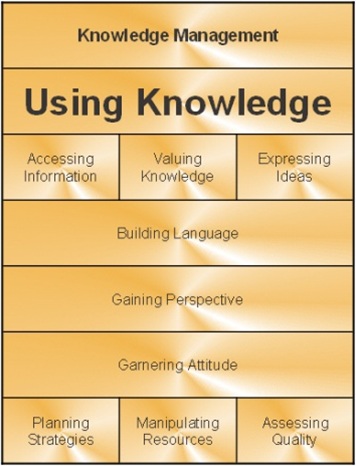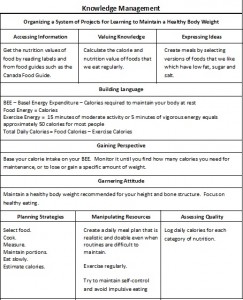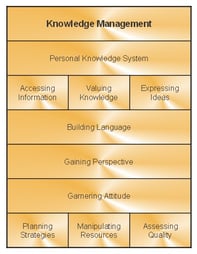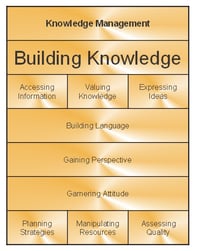Published on
Using Knowledge Through Knowledge Management
 In my previous article on organizing knowledge, I talked about motivation. The next step in taking control of learning is to turn our motivations into accomplishment by trying different things and taking calculated risks. We try different things through our projects. If we did not take risks, we would never accomplish anything.
In my previous article on organizing knowledge, I talked about motivation. The next step in taking control of learning is to turn our motivations into accomplishment by trying different things and taking calculated risks. We try different things through our projects. If we did not take risks, we would never accomplish anything.
Projects are meaningful activities that result in providing a service or producing a product for ourselves or for someone else. Throughout our lives we undertake countless projects at work, at play, in the community, to enhance our lifestyles, and sometimes in education.
When education is project-based, it is more in tune with natural learning. The best examples of project-based education are in colleges where shops and laboratories allow students to apply knowledge on a continuous basis. Although we applaud academic education as being the higher form of learning, in fact, it is experiential learning that is the most complex. Because it is more difficult to quantify, we have ignored experience as a viable option for schooling, and opted for a less effective simpler form of education because of our obsession with measuring it. We have simplified knowledge to make it fit our knowledge measuring systems and made it the focus of schooling, all done at the expense of not allowing the natural learning process to function properly. It is much like the tail wagging the dog.
So how do we bring experiential learning into mainstream education? We need a system for designing education from a project perspective. We need to take knowledge and organize it into meaningful projects and use it as the basis for schooling. This is not a new idea. It has been going on in many schools around the world since schooling was invented. However, the approach has never been generalized to the extent that it can provide the consistency to serve as a model for schooling. Ironically, it is considered by many to be second class learning.
Project-based learning cannot be generalized on its own because it is only a part of the human knowledge management process. But within the whole context of knowledge management as I am describing it in those articles, it can be organized and implemented anywhere. Curriculums will be comprised of systems of projects. We can also computerize the frameworks we develop and link the various pieces of learning in each framework to Internet resources. Frameworks can be used for collaboration among teachers, among learners, and among teachers and learners.
The learning process frame can be used to organize and generate learning projects. I am going to take an example here that will be meaningful to everyone. With the variety and complexity of foods available today, it is very challenging to eat properly. How do we organize a set of projects to learn how to maintain a healthy body weight? I am not a nutritionist so what I am writing is my own opinion and should not be taken as professional advice. It is an adaptation of what I do myself. The frame is meant to illustrate the use of meaningful projects as a teaching / learning tool. Using this general frame, we can design specific daily, weekly and monthly projects that we can use to learn and develop suitable routines. We will need to experiment a little and develop levels of comfort. As we build our eating and exercise routines and gain more experience, we can intuitively add variety to our projects.
In the beginning we may need to log what we are doing, but eventually when we are satisfied with the system we have developed and entrenched, we will not need that as much. Keeping a log is important as long as we are doing any substantial learning. When we create projects for use in education, logging or portfolio development is the preferred evaluation process. By keeping logs, we can provide more detail about what we know and where we need to make changes and improvements. Portfolios help teachers to know where to intervene and influence the learning of students. That is the subject of my next article.




